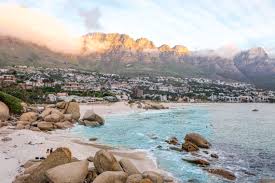Thursday, March 22, 2018
 A radical development is taking place in South Africa. The warm, dry climate of this beautiful country which has turned it into such a popular tourist destination also makes water a particularly precious resource. Driven by climate change, South Africa is positively changing its relationship with water and encouraging everyone to become more water wise. And this is most noticeable in South Africa’s vibrant tourist sector. How they are doing this makes for some truly remarkable stories.
A radical development is taking place in South Africa. The warm, dry climate of this beautiful country which has turned it into such a popular tourist destination also makes water a particularly precious resource. Driven by climate change, South Africa is positively changing its relationship with water and encouraging everyone to become more water wise. And this is most noticeable in South Africa’s vibrant tourist sector. How they are doing this makes for some truly remarkable stories.
The cuisine of the Western Cape is world famous, and some of its restaurants have adapted themselves to water wise tourism with remarkable flair. Leading the way is celebrated chef Luke Dale Roberts who has introduced innovative water-saving techniques in his award-winning restaurants. Floors are mopped with water harvested from air-conditioning units, and diners are asked if they mind using the same cutlery throughout the meal—they almost always agree. Each dish is served on a disposable card fitted into a picture frame, an artistic touch that saves washing 5,000 plates a week. Even the menus have been given a waterless twist.
Across the country hotels are exploring new ways to reduce their water footprint. The Oyster Box in Durban has incorporated some leading practices in eco-tourism, including harvesting ‘grey’ water from showers, baths and basins to be filtered and pumped to holding tanks used for flushing toilets.
Meanwhile, rainwater is directed off its roofs and through an extensive underground pipe network to a large storage tank for use in the gardens. Elsewhere, across South Africa polite signage reminds guests to be water wise, explaining the importance of low-flow fittings on taps and shower heads, enforced half-flushes on toilets, the absence of bath plugs, and why ordering a bottled drink without a glass could earn you a discount on your bar bill.
Golf clubs are being encouraged to find better ways of keeping their greens green, from harvesting and storing water for irrigation to landscaping with local plants and using indigenous grasses: The Cape Town Open golf tournament consciously moved to a course irrigated by effluent water. Similarly, The Old Mutual Two Oceans Marathon drew its drinking water from an approved natural spring and cooled hydration packs with ice made from recycled water. Many game reserves have their own natural water supplies that are sustained and managed with ever more care. And when it comes to the little things, safari lodges encourage tourists to bring quick-dry lightweight clothes that can be hand washed, and to hold onto half-drunk bottles of water from game drives to pour over thirsty pot plants.
In just three years Cape Town has cut its water consumption from 1.2 billion litres to 515 million, setting the benchmark for cities around the world. South Africa is settling into a new culture of efficient water-use that could see it become as famous for world-leading water conservation as for its wonderful wildlife, cosmopolitan culture, and beautiful beaches. Indeed, while the rains may sometimes be scarce, water wise tourism is keeping South Africa very much open for business and the welcome is as warm as ever. South Africa has got the message: every drop of water counts.
Tags: South Africa
Tuesday, April 23, 2024
Tuesday, April 23, 2024
Tuesday, April 23, 2024
Tuesday, April 23, 2024
Tuesday, April 23, 2024